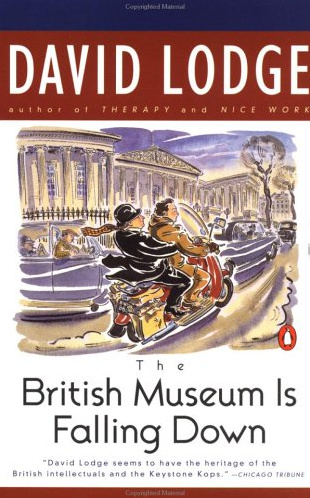

David Lodge · 182 pages
Rating: (2.2K votes)
“Literature is mostly about having sex and not having children. Life is the other way around”
― David Lodge, quote from The British Museum Is Falling Down
“perhaps it will I said perhaps it will be wonderful perhaps even though it won't be like you think perhaps that won't matter perhaps”
― David Lodge, quote from The British Museum Is Falling Down
“It's a special form of scholarly neurosis,´ said Camel. `He's no longer able to distinguish between life and literature.´”
― David Lodge, quote from The British Museum Is Falling Down
“La desgracia de Adam Appleby era que, en cuanto despertaba del sueño, su conciencia se inundaba inmediatamente de todo aquello en lo que menos deseaba pensar. Tenía la impresión de que otros hombres se enfrentaban a cada nuevo amanecer con la mente y el corazón renovados, llenos de optimismo y decisión; o bien de que se arrastraban ganduleando durante la primera hora del día en un estado de bendito sopor, incapaces de pensar en nada, ni agradable ni desagradable. Pero, agazapados como arpías en torno a su cama, los pensamientos desagradables esperaban para asaltarle tan pronto como Adam parpadease y abriera los ojos. En aquel momento se veía obligado, como alguien que se ahoga, a examinar su vida entera, dividido entre lamentaciones por el pasado y miedos futuros.”
― David Lodge, quote from The British Museum Is Falling Down
“Adam había sacado la conclusión que, de todas las industrias del país, la reparación de vespas era la que representaba una mayor sobredemanda respecto a la oferta. En teoría, a quien se dispusiese a satisfacer esa demanda le esperaba una fortuna; pero en el fondo de su corazón Adam dudaba de que las vespas fuesen reparables, en el sentido normal del término; eran las mariposas de la carretera, organismos frágiles que tardaban mucho en ser fabricados y muy poco en morir.”
― David Lodge, quote from The British Museum Is Falling Down

“Una curva de la calle puso ante su vista el campanario de la catedral de Westminster, la forma fálica más descarada del horizonte londinense.”
― David Lodge, quote from The British Museum Is Falling Down
“Cambiando de postura en el sillín, Adam pensó que la forma en que su humilde vida seguía los moldes de la literatura tenía algo como de metempsicosis. ¿O quizá -se preguntó, hurgándose la nariz- era consecuencia de estudiar tan detenidamente las estructuras de las frases de los novelistas ingleses? Uno se había resignado a no tener ya un lenguaje privado, pero se aferraba melancólicamente a la ilusión de poseer los hechos de su vida.”
― David Lodge, quote from The British Museum Is Falling Down
“We're still in the Dark Ages. The scared and the superstitious savage still lurks behind the mask of civilization and he will remain there for untold generations to come.”
― Michael Talbot, quote from The Delicate Dependency: A Novel of the Vampire Life
“Am struck by paradoxical thought that youth is by no means the happiest time of life, but that most of the rest of life is tinged by regret for its passing, and wonder what old age will feel like, in this respect. (Shall no doubt discover very shortly.)”
― E.M. Delafield, quote from Diary of a Provincial Lady
“Someone once said, People come into your life for a reason, a season, or a lifetime. They forgot one other option: Some people come only to give us their contact information, let us know that we really need to get together sometime, and why don’t we give them a call?”
― Caprice Crane, quote from Stupid and Contagious
“I muscled through the moment with my usual delicacy.”
― Nicole Peeler, quote from Tracking the Tempest
“Ludwig Wittgenstein once said that names are the only things that exist in the world. Maybe that's true, but the problem is that as time passes by, names do not remain the same - even if they don't change.”
― Victor Pelevin, quote from The Sacred Book of the Werewolf
BookQuoters is a community of passionate readers who enjoy sharing the most meaningful, memorable and interesting quotes from great books. As the world communicates more and more via texts, memes and sound bytes, short but profound quotes from books have become more relevant and important. For some of us a quote becomes a mantra, a goal or a philosophy by which we live. For all of us, quotes are a great way to remember a book and to carry with us the author’s best ideas.
We thoughtfully gather quotes from our favorite books, both classic and current, and choose the ones that are most thought-provoking. Each quote represents a book that is interesting, well written and has potential to enhance the reader’s life. We also accept submissions from our visitors and will select the quotes we feel are most appealing to the BookQuoters community.
Founded in 2023, BookQuoters has quickly become a large and vibrant community of people who share an affinity for books. Books are seen by some as a throwback to a previous world; conversely, gleaning the main ideas of a book via a quote or a quick summary is typical of the Information Age but is a habit disdained by some diehard readers. We feel that we have the best of both worlds at BookQuoters; we read books cover-to-cover but offer you some of the highlights. We hope you’ll join us.